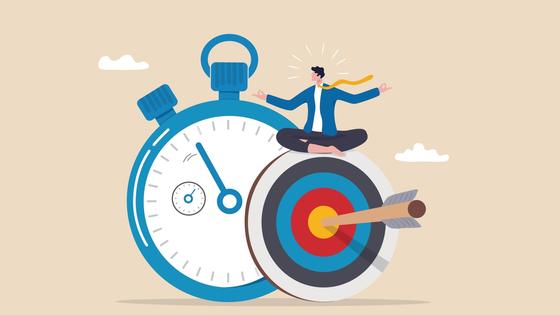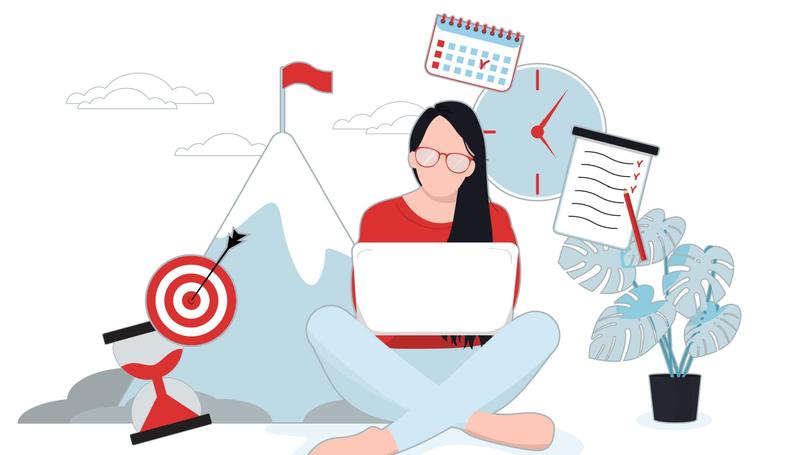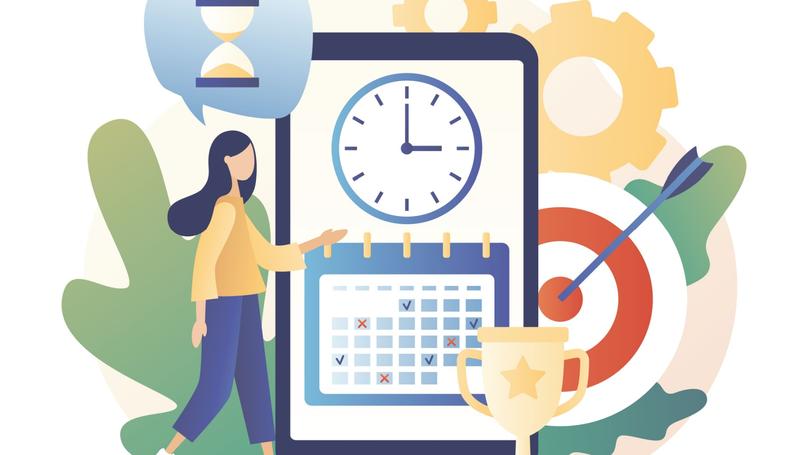10 ways to discipline yourself to work twice as fast
Perhaps you occasionally find yourself at your computer at the end of the day, realizing that of all the tasks you planned, you only answered a few emails.

This may be caused by emotional burnout, or maybe (and most likely) you just don't know how to discipline yourself. In this article, we've compiled the top 10 ways to tone yourself up and do your work twice as fast.
Method 1: Eisenhower Matrix
This is an excellent tool for prioritizing your tasks. Chances are you're not getting your work done on time because your to-do list is overloaded - this applies to almost every person nowadays. You don't know which task to tackle first, and you randomly distribute your energy and time. If this is the case, the Eisenhower Matrix can help you. It is very straightforward.
Break down your entire daily (or weekly) task list into four blocks:
Block A - Urgent and Important
Block B - Not urgent but important
Block C - Not urgent or important
Block D - Urgent but not important
The priority, of course, is to take on the tasks in Block A. Ideally, no tasks should be left in this box for the next day. Block B will mainly feature things we need to get done during the day. Block C contains items you can safely remove from your list and free up time for tasks from blocks B or D or to relax. Block D contains tasks that cause you stress and waste time. It would be best to delegate them or do the bare minimum between Blocks A and B.
Method 2: Do the complex tasks in the morning
Of course, we all have our own biorhythms and preferences. Still, research by Harvard scientists showed that we're most disciplined, energized, and ready to stick to our plan in the morning (when our day begins). You can combine this method with the Eisenhower one and schedule important things you don't want to do for the morning. That way, you'll free your day from the unpleasant emotions associated with tasks you dislike.
Method 3: The Pomodoro Method
You've probably heard of it before, but let's recollect how exactly it works:
- Set your timer for 25 minutes.
- When the time is up, give yourself a 5-minute break.
- Get back to business for the next 25 minutes.
- Repeat the procedure 4 times.
- Take a 15-minute break before the fifth one.
This method is great for mobilizing resources to accomplish specific tasks. However, it is not very helpful for smaller ones because they can be just over or under 25 minutes long.
Method 4: Stick to the "Two-minute rule"

This straightforward rule of thumb says, "If you have time to complete a task in two minutes, do it right away." This way, you will eliminate many minor distractions that occupy your attention and prevent you from achieving your main goal. This rule has a lasting impact as well. For example, you need to write a report and don't want to start because you know it will take about 5 hours. But it won't take you more than two minutes to create a document, write an introduction, create a spreadsheet, and open the reports program. Do it! And you'll see how easily you started on an energy-intensive action. After that, things will go much easier because, most of the time, it is the "blank slate anxiety" that holds us back.
Method 5: Eliminate distractions from your workspace
To focus on an important task, put your cell phone on silent mode. Among other distractions are pop-up notifications on your desktop, the aroma of fresh coffee, a hunger pang, street noise, or music.
You are often unaware that you spent half an hour scrolling through photos on social media. Use apps to keep track of your screen time. For example, install Quality Time. This app offers not only statistics but also enables the use of other apps to be limited. You can also create several profiles - for your work, studies, and evenings and block all notifications and calls.
It is best to eliminate as many distractions as possible if not all of them. Here's a tip you can use.
Method 6: Plan for rest
We often procrastinate when we know the task will require a lot of effort. We feel tired when we just think about our tasks. We lose motivation and start doing things just for fun. Promise yourself a sound break or reward when you finish your tasks. For example, you've long put off going to a pizza place with your friends. Or you've long wanted to take a bath and watch a new TV series. What better reason to finally allow yourself to do that? With the right reward, your inner procrastinator will give in because it will get the fun it wants, but just a little later. Make sure you have a rule for yourself: if you do NOT accomplish the task, you won't go anywhere even if you have a ticket, because instead of the long-awaited concert, you'll finish the task. Believe me, after one or two such "penalties," your productivity will increase.
Method 7: Keep a record of your successes and completed tasks

When there are too many unfinished tasks, even at the end of the day, and your to-do list is still full, it may seem that you haven't accomplished anything at all. This, in turn, will likely lead to frustration and a feeling that all your efforts have been wasted. Make sure you celebrate your achievements to feel that you've accomplished a difficult task and to get the hormonal reward from your brain's pleasure center. For example, keep a special diary or a day planner. Take time to praise yourself and internalize that you did well on a not-so-easy, busy day. It will also help you finally relax after hard work.
Method 8: Do quick meditation
A great way to increase your concentration is to do some meditation. You don't have to sit for an hour with your eyes closed - just 15 minutes will do. Sometimes, spending even a few minutes with your eyes closed and focusing on breathing will reboot your brain and give you more power to act.
Here's an example of the simplest meditation type - breathing.
- Focus your gaze on any square- or rectangular-shaped object. It can be your smartphone, a picture frame, or a window.
- Look at the upper left corner and inhale deeply through your nose. Slowly count to four.
- After counting, move your gaze to the upper right corner. Hold your breath and count to four again.
- Now lower your gaze and exhale through your mouth. Count to four again.
- Complete the square by moving your gaze to the lower left corner. Count to four.
- Take a deep breath and repeat the process.
It is up to you to decide how many times you need to do it. One go may be enough for you. Or you may want to stay in this state longer. Choose whatever brings you the most relaxation and comfort.
Method 9: Act rather than think
We often ask ourselves: "How strong is my motivation to do this task"? And we proceed from there. We take it on if we feel motivated. If we are not, we put off the assignment. However, motivation is one of the most unreliable sources of strength! It's ever-changing. You can be 100% determined when you take up a task and lose motivation an hour later, and no amount of motivation-building will help you. You'll give up and start blaming yourself again. But the truth is that the same principle is at work as the one with your appetite. Perhaps you know the phrase: "The appetite grows by eating." It's the same with motivation! One of the cognitive behavioral therapy methods is "changing one's behavior to change one's thinking'. This means that all changes should be initiated by action, not thought. A journey of a thousand miles begins with a single step!
Lectera’s Online Courses by topic
Method 10: Learn to say No and assert your boundaries
Say No to everyone and everything that prevents you from completing a task on time. Friends can invite you for a get-together and blame you for not writing for a long time. Explain that you are involved in an important project. Perhaps your colleagues dump extra tasks on you. Set personal boundaries, and don't take on more than you can accomplish. A No and personal boundaries are two of the most important things to help you free up more work time and improve your leisure and work balance. You'll be much more productive when you learn to reduce unnecessary things.
Follow the steps below:
-
Right now, list 5 things you want to say No to.
-
Think of ways you can eliminate or minimize them. Choose ways that won't affect your remaining tasks or relationships with others.
-
Discuss available options with those involved (for example, your coworkers, who you can ask to move their conversations from the office to the hallway).
Many people find self-discipline challenging. But if you start applying the new strategies, you'll see how quickly you'll free up your time for more productive habits. Step by step, you'll free your life from unnecessary tasks, unlocking your time and energy to achieve your loftiest goals! We are confident that even a couple of new productive habits can lead you to the success you strive for!
Share this with your friends via:
Latest News

A significant stage in the development of the alternative education system has begun in West Northamptonshire in the UK: the County Council is actively calling on parents, guardians, and trustees to participate in shaping the future of this key area.

Outwoods Primary School in Atherstone, Warwickshire, having experienced deep sadness after the loss of their famous cat, Silla, has found solace in a new pet – a Maine Coon named Aloysius O’Hara.

In modern universities, artificial intelligence, and in particular ChatGPT, is rapidly transforming from a controversial tool into a full-fledged student assistant.

An innovative educational project is gaining momentum in UK primary schools, aiming to change attitudes towards video games.

The Massachusetts Institute of Technology (MIT) presents MIT Learn – a revolutionary online platform that opens a “new front door” to access university knowledge and resources.












 Test. Check Your Social Media Dependency Level!
Test. Check Your Social Media Dependency Level!
 Test: What Business is Right For You?
Test: What Business is Right For You?
 “I’m Here for the Long Haul”: When Loyalty to a Company Becomes Toxic
“I’m Here for the Long Haul”: When Loyalty to a Company Becomes Toxic
 Test: How Prone Are You to Abusive Behavior as a Manager?
Test: How Prone Are You to Abusive Behavior as a Manager?
 Test. What superpower would you possess if you were a superhero?
Test. What superpower would you possess if you were a superhero?
 Test. What Should You Let Go of Before Winter Ends?
Test. What Should You Let Go of Before Winter Ends?
